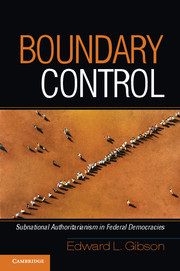2 - Territorial Politics and Subnational Democratization
Charting the Theoretical Landscape
Published online by Cambridge University Press: 05 January 2013
Summary
All of my maps have been overthrown.
Jeff TweedyTo ordinary individuals the pains and trials of authoritarianism delivered by local authorities may be hard to distinguish from those delivered by national authorities. “National” versus “subnational” authoritarianism may be inconsequential distinctions to people experiencing the dreary poverty of rights of autocratic rule. Yet the territorial source of authoritarian rule is consequential – it is consequential for politics and it is consequential for theory. Political actors in struggles for local democratization face strategic and institutional challenges that are quite different from those faced by protagonists of national democratization struggles. Similarly, social scientists seeking to understand subnational authoritarianism's dynamics must address hierarchies and mechanisms that are unique to the internal territorial organization of countries.
A focus on subnational processes of authoritarianism and democratization demands not only a shift in the scale of observation but also a new set of theoretical lenses that help us see political dynamics invisible to those focusing on national units. Thus the study of subnational democratization should not be seen as a theoretical derivative of national democratization, wherein the main challenge lies in identifying which theories developed for the study of countries can be transferred to the study of provinces. It is a field with theoretical and empirical challenges that, although overlapping in many ways with its “parent” field, are unique to the subnational level of analysis. Subnational democratization is not democratization in short pants.
- Type
- Chapter
- Information
- Boundary ControlSubnational Authoritarianism in Federal Democracies, pp. 9 - 34Publisher: Cambridge University PressPrint publication year: 2013

